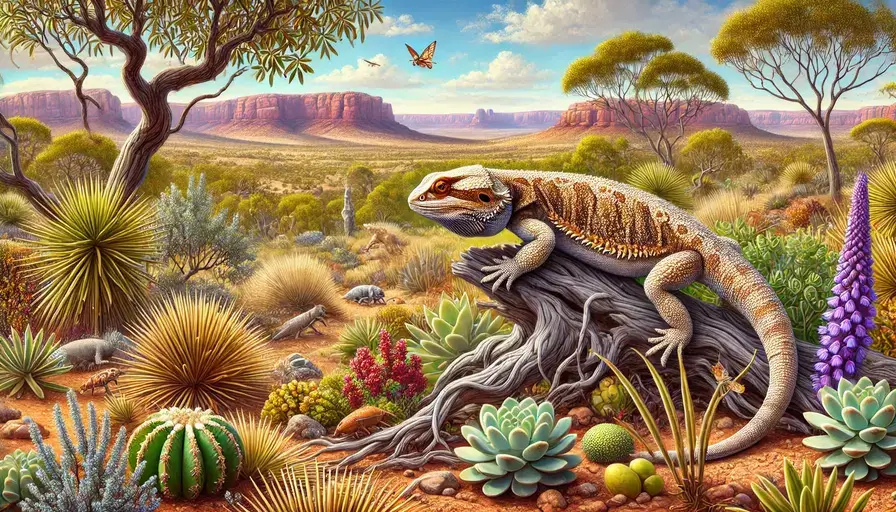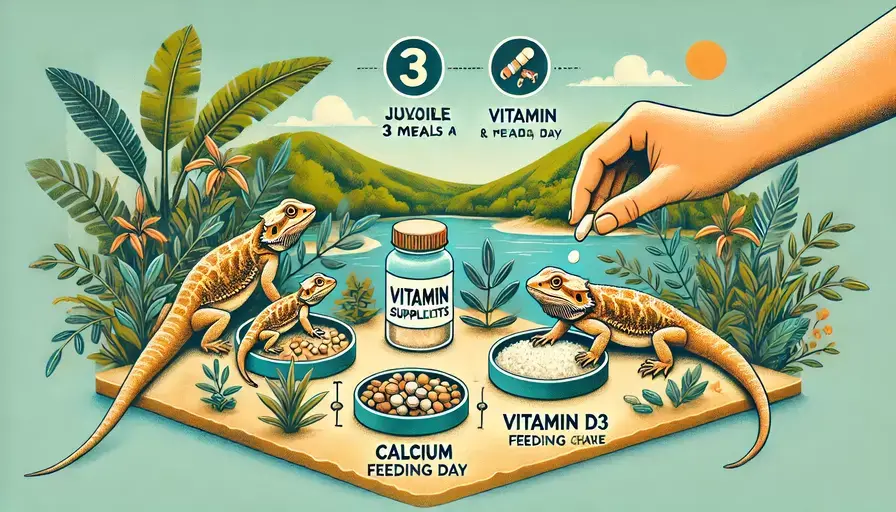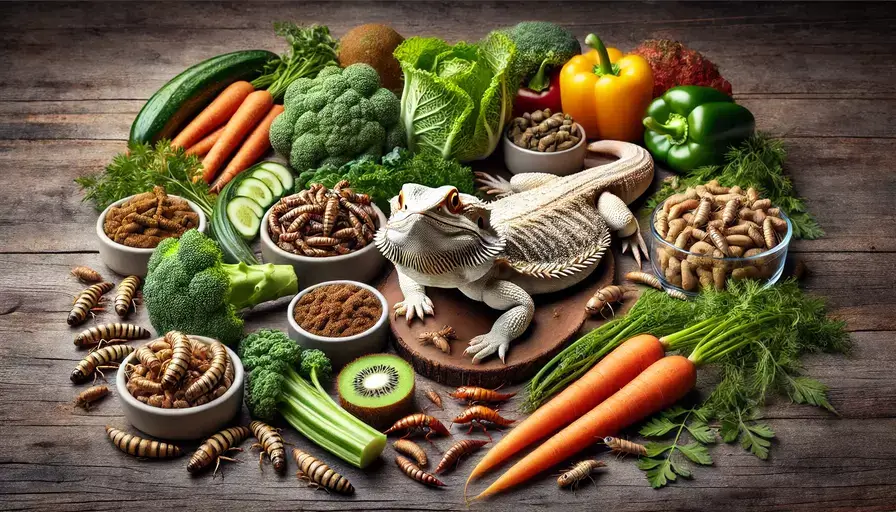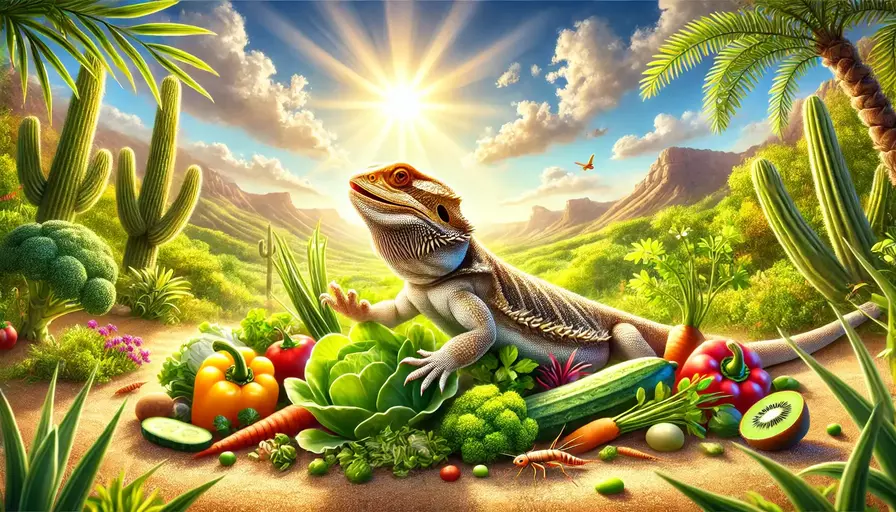A good nutritional programme is the foundation for a healthy and long life for bearded dragons. This guide will show you the types of supplemental foods and amounts to add to your adult bearded dragon’s diet so that it more closely resembles the varied and free-living diet of wild bearded dragons. So let’s dive in to understand how you can achieve and maintain the ultimate bearded dragon diet!
Understanding the Bearded Dragon Diet
Bearded dragons are native to Australia and an environment of arid lands. They are omnivores. A well-balanced bearded dragon diet in the wild is prey insects, small animals, vegetables, and some fruits. It is super important to replicate all these vegetation and meats in the Bearded dragon pen to keep your little (bearded) dragon sharp and healthy!

Essential Components of a Bearded Dragon Diet
Insects and Proteins: Crickets, mealworms, waxworms and all other creepy-crawlies make up the biggest share of your Bearded Dragon’s diet, specifically their childhood diet.
Veggies and Fruit: Adult beardies are on veggies 80 per cent of the time, greens and bell peppers. But no fruit – even if tempted, it ain’t good. It has too much sugar. Fruits may only be given in very low frequency.
Best Vegetables for Bearded Dragons
Vegetables should form a significant part of your bearded dragon’s diet. Here are some of the best options:
- Collard Greens: High in vitamins and calcium, and low in oxalates, which can hinder calcium absorption.
- Butternut Squash: Full of nutrients and easy to digest, it’s also a good source of fiber.
- Bell Peppers: High in vitamin C but low in sugar, making them a healthy choice that adds color to the diet.
- Carrots: Rich in beta-carotene, which converts to vitamin A, but should be given sparingly due to their sugar content.
Best Fruits for Bearded Dragons
Fruits should be offered less frequently due to their sugar content. Here are some safer choices:
- Blueberries: Low in calories and high in antioxidants, perfect for an occasional treat.
- Apples (peeled and cored): Provide fiber and vitamins but should be given in moderation due to their sugar content.
- Papaya: A good source of vitamins and digestive enzymes, which can aid in breaking down food.
- Figs: High in fiber and calcium, which are essential for bone health.
Best Insects for Bearded Dragons
Insects are a critical part of a bearded dragon’s diet, especially for protein. Here are some of the best insects to include:
- Crickets: A staple in many bearded dragon diets, they’re high in protein and relatively low in fat.
- Dubia Roaches: More nutritious than crickets, they have a higher protein content and a better calcium-to-phosphorus ratio.
- Mealworms: High in fat, so they should be fed sparingly, but are a good treat.
- Black Soldier Fly Larvae: Excellent for their high calcium content, making them a great choice for bone health.
How to Feed Your Bearded Dragon
Feeding Schedule: For juveniles, feed three times a day. For adults, feed one time a day. Adjust portion size as your dragon ages, grows and becomes more active.
Supplements: Calcium and vitamin D3 supplements are essential to prevent metabolic bone disease. Dust your bearded dragon’s food with these supplements several times a week

Common 3 Dietary Issues and How to Avoid Them
A healthy, wide and varied diet can prevent issues like obesity. So make sure you spoil them with a range of foods, so you’ll avoid the risks of an out of balance or ‘deficient in nutrients’ diet for your awesome bearded dragon friend.
1. Overfeeding Leads to Obesity
Overeating and obesity are the common hazards that bearded dragons are prone to, thanks to the insect-heavy diet that modern bearded dragons typically receive.
Solution: Keep track of how much you’re feeding them, and feed regularly on a schedule that’s age- and activity-appropriate. Feed healthy veggies and greens to keep calories in check.
2. Nutritional Deficiencies from Unbalanced Diets
Deficiency: In a bearded dragon’s diet, the lack of meal diversity can cause significant mineral deficiencies, particularly calcium that is required for bone health.
Answer: Depending on the animal, a variety of calcium-rich greens and vegetables, plus approved fruits from the lists: Supplement with vitamins and minerals. Take your bearded dragon diet to your vet quarterly or so and fine-tune.
3. Risk of Metabolic Bone Disease (MBD)
The most common metabolic bone disease (MBD) stems from not enough calcium in the diet, paired with either an improper amount of phosphorus in the diet, or an insufficient amount of UVB light.
Solution: Make sure your bearded dragon’s habitat has a UVB light source, and that their diet has the right calcium-to-phosphorus ratio. And make sure growing dragons have calcium supplements. Make sure your bearded dragon diet follows these guidelines.
Sample Bearded Dragon Diet Plan
Set a weekly feeding schedule of proteins, vegetables and occasional fruits, every day including one day of fasting to aid digestion.

FAQs on Bearded Dragon Diet
Can Bearded Dragons Eat Grapes?
Can Bearded Dragons Eat Strawberries?
Can Bearded Dragons Eat Bananas?
Can Bearded Dragons Eat Spinach?
Can Bearded Dragons Eat Tomatoes?
Can Bearded Dragons Eat Apples?
Can Bearded Dragons Eat Carrots?
Conclusion
It’s important to keep your bearded dragon diet varied for optimal nutrition, and to make sure to check in with a veterinarian to ensure your feeding technique is in line with their nutritional needs, and to determine if any diet changes should be made as your beardie’s health changes.

